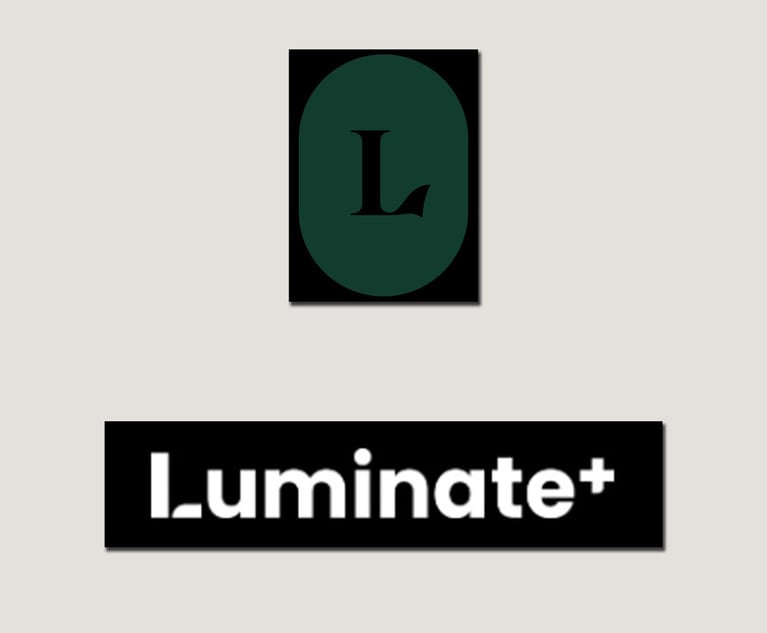Is It Time to Cancel Nondisclosure Agreements?
"Quite honestly, you don't give yourself any further protections at law for having put those documents in place," says Susan Hackett, CEO of law practice management consulting agency Legal Executive Leadership.
June 18, 2020 at 12:05 PM
9 minute read
 (Phoro: Novikov Aleksey/Shutterstock.com)
(Phoro: Novikov Aleksey/Shutterstock.com)
Nondisclosure agreements are having a moment. And it's not a particularly good one.
Harvey Weinstein, now serving a 23-year prison sentence, used confidentiality contracts in an attempt to keep his sexual assault victims quiet. His case—and other similar cases—spurred #MeToo-related legislative proposals throughout the country to ban NDAs related to sexual assault, harassment and discrimination claims.
More recently, the Justice Department cited a secrecy agreement in its attempt to block former national security adviser John Bolton from publishing a memoir, "The Room Where It Happened," about his time with the Trump administration. The government's argument has sparked new scrutiny over how NDAs are wielded to keep former employees silent.
With so much bad press swirling around NDAs and with confidentiality contracts under increased scrutiny, it's not all that surprising that a growing number of corporate legal departments are starting to question the value of NDAs.
 Susan Hackett of Legal Executive Leadership. (Photo: Christophe Avril)
Susan Hackett of Legal Executive Leadership. (Photo: Christophe Avril)"Quite honestly, you don't give yourself any further protections at law for having put those documents in place," says Susan Hackett, CEO of law practice management consulting agency Legal Executive Leadership in Chevy Chase, Maryland.
Hackett reports that she's hearing more and more talk from corporate counsel about ditching NDAs, primarily because they don't offer much benefit and the process can be onerous and time-consuming, especially when both sides engage in a tug of war over the terms of an agreement.
"The purpose they serve is to put people on notice," she says. "I'm not suggesting that it doesn't serve some purpose for those people who don't know about these kinds of issues. But in terms of compliance responsibilities, I'm not sure that you can prevent someone who has criminal intent from exercising that intent."
Hackett's corporate legal department clients have been telling her that they've been trying to address confidentiality issues with NDAs "when quite honestly it doesn't give us any greater benefit for someone who is malicious."
In other words, if an employee or client is intent on stealing trade secrets an NDA probably isn't going to convince them to change course.
"If you violate the nondisclosure agreement, you're going to get prosecuted if we catch you, but the fact that you have an NDA doesn't mean I have any greater or fewer opportunities to sue you or stop you," Hackett says.
'I'd like to see more thoughtfulness'
Former IBM contract negotiator, Don Riddick, now chief legal officer of Atlanta-based financial crime software company Featurespace, has examined thousands of confidentiality agreements over the years. Looking back, he says it was highly unlikely that the majority of those NDAs would ever have been enforced.
 Don Riddick, chief legal officer, Featurespace. (Courtesy photo)
Don Riddick, chief legal officer, Featurespace. (Courtesy photo)In his experience, most NDAs cover a "broad range of innocuous information" and, when these boilerplate confidentiality provisions are thrown at every commercial transaction, from requests for information to mergers and acquisitions, they often end up being "counterproductive."
"I question any contract element that is unlikely to be enforced, and in NDAs, the broad scope we typically see covers areas that would be hard, if not impossible, to seek a judgment upon," Riddick says.
Legal departments should take a judicious approach to confidentiality agreements. In-house leaders should question whether they truly need to share sensitive material with a potential business partner, customer or employee.
"There are very few cases where commercial discussions expose any truly sensitive information, other than special pricing," Riddick says. "I'd like to see more thoughtfulness around the necessity of NDAs instead of defaulting to them at the start of every meaningful conversation."
He adds, "I've heard more than one investor in my career say, 'If you need an NDA to tell me about this, then don't share it with me.'"
To make the NDA process more efficient, Riddick prefers to use confidentiality agreements only when he and his legal team feel that an agreement is absolutely necessary. When confronted with a request to sign an NDA, his legal team limits its "comments to areas we think are likely to be enforced," Riddick says.
As an alternative to confidentiality contracts, corporate legal departments should consider publicity clauses—they are more than narrow than an NDA, which prohibits the disclosure of sensitive info and its use— in many situations outside of M&A deals, such as requests for proposals and sales conversations, according to Riddick.
"In those cases, a publicity clause is likely a better tool to protect a company than an NDA," he says.
While Riddick prefers to use NDAs only when sensitive information is being shared, he acknowledged that his company also enters into confidentiality agreements when doing so is important to a customer or business partner and bolsters trust within the relationship.
Still, he dislikes agreements that cast too wide of a net and are essentially "privacy, information security and nonsolicit agreements."
"While all of those things are important, they are not generally necessary for an NDA, and I'm seeing these agreements and their terms become more expansive," he says. "What would previously be a one- or two-page understanding to keep things in confidence now takes up five to seven pages of terms on a breadth of topics, disguised as an NDA."
Of course, the coronavirus COVID-19 pandemic has added another wrinkle to the NDA process as more employees are working remotely than ever before. Riddick says the outbreak has created "greater urgency" around addressing confidentiality issues.
"The sharp increase in virtual meetings has also decreased the timeframe for getting an NDA in place," he adds. "Before, we would have a few days to prepare an agreement to bring to a physical meeting, and now it's something we have to deliver within a few hours."
'Not a magic bullet, but it certainly helps'
Interestingly, though perhaps predictably, outside counsel seem to have a different perspective on NDAs. They stressed that the benefit of having an agreement in place typically outweighs the headache of going through the NDA process.
"It makes clear about what is confidential and what is a trade secret, so you're not debating that later or you're less likely to debate it," says David Woolf, a partner and employment litigator at Faegre Drinker Biddle & Reath in Philadelphia. "You'll still have to show it in court, but it's a huge advantage to say, 'Judge, we shouldn't be talking about this because he and the company have agreed that this is confidential.'"
He adds, "It's not a magic bullet, but it certainly helps. … I think it's absolutely worth it."
Of the five litigators and outside legal advisers interviewed for this story, not one reported having heard their corporate clients question the usefulness or efficiency of the NDA process. But they understood why in-house leaders might be frustrated with the process.
For instance, David D'Urso, a partner at Akin Gump Strauss Hauer & Feld in New York who acts as outside general counsel to private equity funds, was a "little surprised" to hear that some companies were using NDAs so frequently.
"I can see where you would waste a lot of time in a situation where you're not getting much value out of it," he says.
Employer defense attorney Mark Payne, a partner at Troutman Sanders in Orange County, California, agreed that NDAs shouldn't be all-encompassing. The contracts should be tailored to the needs of a business. And when they're wielded in a heavy-handed manner or are too broadly written, an NDA can kill business discussions and potential opportunities.
"It's like so many things. You have to use some business judgment about where to draw the line without creating so much burden that we never get off the ground and weigh that against something that's going to mess up our business plans because it wasn't kept confidential," Payne says.
Erin Ebeler Rolf, a labor and employment attorney at Woods Aitken in Denver and Lincoln, Nebraska, agreed that the thoughtful, strategic approach to NDAs is the best approach. But, like other outside counsel, she was leaning pro-NDA.
"To maintain trade secret status, you often need to demonstrate that you've taken reasonable steps to protect the information," she says. "If you're sharing trade secret information absent an NDA, you may jeopardize the protections afforded to that information in other contexts."
She adds, "Overall, I think it really depends on a lot of factors. There's not going to be a one-size-fits-all answer to whether a nondisclosure agreement has value or not."
This content has been archived. It is available through our partners, LexisNexis® and Bloomberg Law.
To view this content, please continue to their sites.
Not a Lexis Subscriber?
Subscribe Now
Not a Bloomberg Law Subscriber?
Subscribe Now
NOT FOR REPRINT
© 2025 ALM Global, LLC, All Rights Reserved. Request academic re-use from www.copyright.com. All other uses, submit a request to [email protected]. For more information visit Asset & Logo Licensing.
You Might Like
View All
Global Software Firm Trying to Jump-Start Growth Hands CLO Post to 3-Time Legal Chief

In-House Legal Network The L Suite Acquires Legal E-Learning Platform Luminate+

Up-and-Comer Scores First Legal Chief Post With Baltimore Orioles, the Team He Cheered for as Kid

Ad Agency Legal Chief Scores $12M Golden Parachute in $13B Sale to Rival
3 minute readLaw Firms Mentioned
Trending Stories
- 1A Judge Is Raising Questions About Docket Rotation
- 2Eleven Attorneys General Say No to 'Unconstitutional' Hijacking of State, Local Law Enforcement
- 3Optimizing Legal Services: The Shift Toward Digital Document Centers
- 4Charlie Javice Fraud Trial Delayed as Judge Denies Motion to Sever
- 5Holland & Knight Hires Former Davis Wright Tremaine Managing Partner in Seattle
Who Got The Work
J. Brugh Lower of Gibbons has entered an appearance for industrial equipment supplier Devco Corporation in a pending trademark infringement lawsuit. The suit, accusing the defendant of selling knock-off Graco products, was filed Dec. 18 in New Jersey District Court by Rivkin Radler on behalf of Graco Inc. and Graco Minnesota. The case, assigned to U.S. District Judge Zahid N. Quraishi, is 3:24-cv-11294, Graco Inc. et al v. Devco Corporation.
Who Got The Work
Rebecca Maller-Stein and Kent A. Yalowitz of Arnold & Porter Kaye Scholer have entered their appearances for Hanaco Venture Capital and its executives, Lior Prosor and David Frankel, in a pending securities lawsuit. The action, filed on Dec. 24 in New York Southern District Court by Zell, Aron & Co. on behalf of Goldeneye Advisors, accuses the defendants of negligently and fraudulently managing the plaintiff's $1 million investment. The case, assigned to U.S. District Judge Vernon S. Broderick, is 1:24-cv-09918, Goldeneye Advisors, LLC v. Hanaco Venture Capital, Ltd. et al.
Who Got The Work
Attorneys from A&O Shearman has stepped in as defense counsel for Toronto-Dominion Bank and other defendants in a pending securities class action. The suit, filed Dec. 11 in New York Southern District Court by Bleichmar Fonti & Auld, accuses the defendants of concealing the bank's 'pervasive' deficiencies in regards to its compliance with the Bank Secrecy Act and the quality of its anti-money laundering controls. The case, assigned to U.S. District Judge Arun Subramanian, is 1:24-cv-09445, Gonzalez v. The Toronto-Dominion Bank et al.
Who Got The Work
Crown Castle International, a Pennsylvania company providing shared communications infrastructure, has turned to Luke D. Wolf of Gordon Rees Scully Mansukhani to fend off a pending breach-of-contract lawsuit. The court action, filed Nov. 25 in Michigan Eastern District Court by Hooper Hathaway PC on behalf of The Town Residences LLC, accuses Crown Castle of failing to transfer approximately $30,000 in utility payments from T-Mobile in breach of a roof-top lease and assignment agreement. The case, assigned to U.S. District Judge Susan K. Declercq, is 2:24-cv-13131, The Town Residences LLC v. T-Mobile US, Inc. et al.
Who Got The Work
Wilfred P. Coronato and Daniel M. Schwartz of McCarter & English have stepped in as defense counsel to Electrolux Home Products Inc. in a pending product liability lawsuit. The court action, filed Nov. 26 in New York Eastern District Court by Poulos Lopiccolo PC and Nagel Rice LLP on behalf of David Stern, alleges that the defendant's refrigerators’ drawers and shelving repeatedly break and fall apart within months after purchase. The case, assigned to U.S. District Judge Joan M. Azrack, is 2:24-cv-08204, Stern v. Electrolux Home Products, Inc.
Featured Firms
Law Offices of Gary Martin Hays & Associates, P.C.
(470) 294-1674
Law Offices of Mark E. Salomone
(857) 444-6468
Smith & Hassler
(713) 739-1250






